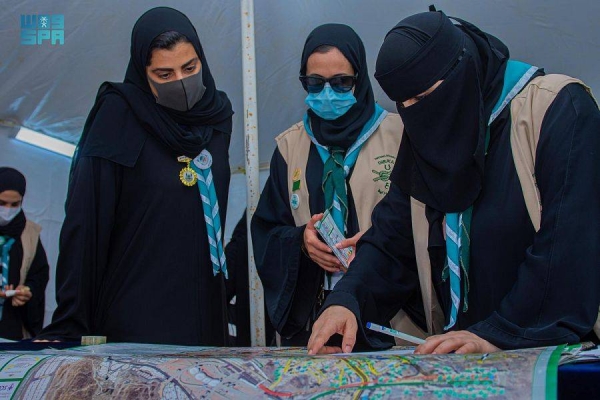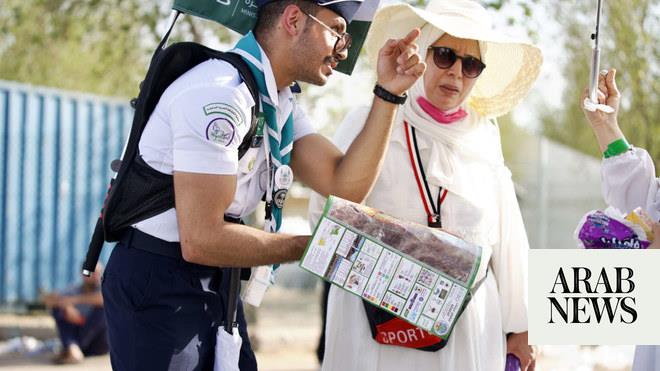
LONDON: Among the thousands of helpers assisting pilgrims at Hajj this year, it was hard to miss one particular group.
In their distinctive neckerchiefs, shirts and caps, they were always on hand, guiding pilgrims back to their tents, reuniting lost children with their parents, giving first aid when people felt ill and generally providing a reassuring presence.
There were 4,500 Scouts on duty in Makkah this year, and another 1,500 in Madinah, all of them volunteers. In fact, the boys and girls of the Saudi Arabian Scouts Association have been a welcome fixture during Hajj since 1961.
Though that was the year the Saudi Arabian Boy Scouts Association was officially founded, Scouts had already been active in the country for many years. But the history of scouting in the Arab world goes back more than a century to the formation of Scout groups in Syria and Lebanon in 1912 — only five years after the birth of scouting in Britain.
In 1914, the Scout Movement came to Egypt, at the behest of Prince Omar Toussoun. Known as a scholar and philanthropist, the prince became set on introducing scouting to his native country after taking part in activities with Scouts during a visit to London. Iraq also joined in 1914.
Much of the Middle East was still under colonial rule in the early part of the 20th century, which undoubtedly was a factor in the rapid spread of the Scout Movement. But it does not explain why the popularity of scouting has not only endured but continues to grow.
Today 18 countries from the Middle East and North Africa form the Arab Scout Region with a 19th, Western Sahara, hoping to join soon. The first Arab Scout Jamboree — mass gathering of Scouts — took place in 1954 in Syria and the 32nd was held in early September in Algeria.
There are more than 50 million Scouts in the world and 28 million of them are Muslim. Indonesia alone has about 21 million Scouts. The Arab region, with 5 million, accounts for a tenth of the total global membership of what is the world’s largest voluntary organization for boys and girls, with a presence in every country except North Korea, China and Cuba.
The world’s Chief Scout and secretary-general of the World Organization of the Scouting Movement (WOSM) is Ahmad Alhendawi, a Jordanian. The global headquarters for scouting is in Kuala Lumpur, Malaysia, a predominantly Muslim country.
This month, the highest honor in scouting, the Bronze Wolf, was awarded to Laila Almeldeen, an Egyptian, who was the first woman at Arab Scout Region HQ and has given more than 50 years of service to scouting.
Past Scouts include King Abdullah of Jordan and his late father, King Hussein, Sultan Qaboos of Oman, the late King Farouk of Egypt, the diplomat and former secretary-general of the Arab League, Nabil Elaraby, and Egyptian actor and director Mohamed Sobhy.
“At conferences, it is exciting to hear ministers mention that they used to be Scouts, and it makes us proud to have a Jordanian as secretary-general for the world scouting organization,” said Ahmed Hassan, head of community development at the Arab Scout Region HQ in Cairo.
How did a movement started by the British in the age of empire — and which many still perceive as white, middle class and Christian — sink such deep roots in the Middle East and among Muslims?
“The values which scouting instils in young people — service to the community, care and respect for others, self-respect — these are universal values and they are at the core of Islam,” said Yousif Eltom, chairman of the UK Muslim Scout Fellowship (MSF).
“Scouting strives to develop well-rounded citizens through a well-structured program. Scouting and Islam do not contradict one another and there are Scouts in nearly every Muslim country of the world.”
MSF was founded by Muslim migrants in Britain who wanted to organize activities for the youth of their communities. Many had been Scout leaders in their homeland, and used their organizational skills in their new country. The British had exported the scouting movement to their colonies and citizens of those former colonies were bringing it back to Britain. There are currently more than 80 Muslim Scout groups all over the UK with more than 5,000 members, aged six to 18, and MSF will celebrate its 20th anniversary next year.
Some, but by no means all, of the MSF Scout troops are connected to a mosque. “We do have a program focusing on spiritual development but we are open to all,” said Eltom. The link to a mosque can be for practical reasons, he added.
“Mosques have facilities, which saves the expense of hiring a hall. The typical group has 20 to 30 Scouts and four or five adults but some of our groups have 200 members. Many mosques simply converted their youth groups into Scout groups because we already have a good structure in place and they could just leave organizing the programs and all the rest to us.”
Eltom, 31, became involved when he saw a friend in Scout uniform at his mosque in Birmingham. “I laughed at him and said ‘What’s that round your neck?’ He belonged to a group that had been set up at the mosque. He said I should give it a try. I really wasn’t keen but agreed to go for half an hour … and that was it. I was hooked. What really impressed me was how the leaders were enjoying the activities as much as the kids. It wasn’t a chore for them.”
He started as a Cub leader and went on to become a Scout and an Explorer (for 14- to 18-year-old Scouts). His wife has also been a Scout leader for eight years and their 4-year-old son “can’t wait” to join too. Most of the 8- to 10-year-old Cubs in his first pack remain involved in scouting, Eltom said. There were barely 100 young people at the first Scout camp he attended. “Last year there were 1,500,” he said.This comes as no surprise to Simon Carter, head of media at the UK Scout Association. “We have had 13 straight years of growth in Muslim membership,” he said. “The first question people always ask is: Is it religious? And do you have to be Christian? Once they get past that, the appeal for Muslims is the strong ethos of trying to bring out the best in young people. The youth programs are seen as especially good for young women because there is generally less provision for them and the Scouts are not gender-biased.”
As a result, scouting is even more popular with girls than with boys. In Blackburn, a town in north-west England where the population is 25 percent Muslim, there are 220 boys on the waiting list to join the local Scout group and 240 girls. “We take great pride in the fact that girls are 50 percent of our membership. In mainstream scouting they make up 23 percent,” said Eltom.
At the Arab Scout Jamboree in Algeria, the medal of honor was awarded for the first time to a girl, Toaa Khaled Mostafa of the Al-Waad Scout Group. Her achievement is all the more remarkable because this was the first time that girls were allowed to attend and they made up 25 percent of all participants.
The 14- to 19-year-olds learned about development projects and did community work in a hospital and public garden. “Toaa Khaled Mostafa has great confidence and she is a great ambassador,” said Al-Waad group leader, Sherif Al-Touny Rokaia Mamdough. “She prepared a great presentation on sustainable development.”
In 2020, Egypt will host the worldwide jamboree for Scouts from all 169 member countries.
“The beauty of the Arab Scout Region is that it unites the Arabs,” said Ahmed Hassan. “The principal of unity is always a part of our conferences and gatherings. We don’t see any differences between us. We work on ways to establish a stronger community. We don’t get involved in politics and if we notice any political abuse from any member we terminate him immediately. Not being political is what has helped us establish the largest youth organization in the world with great success.”
It is 57 years since the first 100 volunteers from the Saudi Arabian Scouts Association took up their posts at Makkah. The Saudi association joined the WOSM in 1963 and hosted the Arab Jamboree in Taif in 2000. The late King Faisal personally gave his blessing for Scout gatherings, which were held every two years from 1964 to 1974 in the Kingdom, and members of the Saudi royal family have attended world jamborees on at least two occasions. Not even war has succeeded in crushing the Scout Movement. “We are seeing a resurgence in Syria and Iraq,” said Carter. After Mosul was liberated from Daesh, a team of male and female Iraqi scout leaders made a symbolic return in April. It was a declaration of intent to revive scouting in their city. How quickly that happens remains to be seen, but they are surely working towards that day. For, as everyone knows, the Scout motto is “Be Prepared.”








